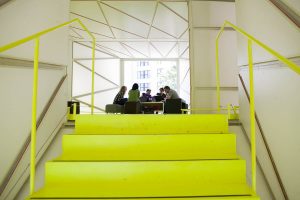DcentMadrid Democracy Lab Day 3: Unconference

Third day here in Madrid with Democracy Lab looking at initiatives for democracy. The unconference-styled day invited everyone to pitch a lightning talk or a suggestion for a workshop. Topics included privacy awareness, open source democracy tools and bottom-up, citizen-led involvement. Participants ranged from developers, researchers, activists, journalists, academics and designers who came together to showcase their work, demo products, debate and plan. Here are a few highlights of the day.
Third day here in Madrid with Democracy Lab looking at initiatives for democracy. The unconference-styled day invited everyone to pitch a lightning talk or a suggestion for a workshop. Topics included privacy awareness, open source democracy tools and bottom-up, citizen-led involvement. Participants ranged from developers, researchers, activists, journalists, academics and designers who came together to showcase their work, demo products, debate and plan. Here are a few highlights of the day.
Data-driven, participatory fact mapping, Pattrn
Open source and free, Pattrn maps for human rights, conflict monitoring, investigative journalism and research and analysis. Recently mapped out the Gaza conflict for Amnesty International and political violence in Africa. Pattrn builds on existing free software libraries and infrastructure and is self-hosted. Grab it, store it, use it.
Re-imagine the city with Hackity
Want to improve your neighbourhood? Create, support and be involved in solutions? Hackity allows you to put out proposals for local improvement – be it a fault on the street or unused public space. Over 500 people currently use it in Madrid – both online through the platform and offline at Hackity dinners and co-design sessions to solve unresolved issues.

Photo: MediaLab-Prado
Online deliberation for massive groups through Baoqu
Mapping conversations, no trolls and open source – are the key points for Baoqu, who haven’t launched yet, but if you’re interested in signing up to be part of their testing group, head to their website. If you are a Spanish speaker they have put up their presentation here.
Irina Bolychevsky , Redecentralizing
Decentralisation is not just technical thing but also sits on a social level – it needs cooperation to function. It requires standards and many nodes working for the same goals. It’s democratic. There are some issues including lack of innovation – dominance of freemium, monopolies, no real choice and lack of alternatives.
Quietly, some geeks are decentralizing the net. Again. Who are they? Why are they doing it? What new technologies are they using? How will this change the world?
Redecentralize interviews them and builds a community around this. Watch Irina talk about redecentralisation on this video.
The book webmarking tool, Worldbrain
It’s a bookmarking tool but for the web. Fact-check web articles, PDFs and videos with custom annotations. You highlight a bit of text to organise, share and discuss your personal web research to build the foundation for verifying the internet with science.
Follow the next few days on Twitter: #DemocraticCities